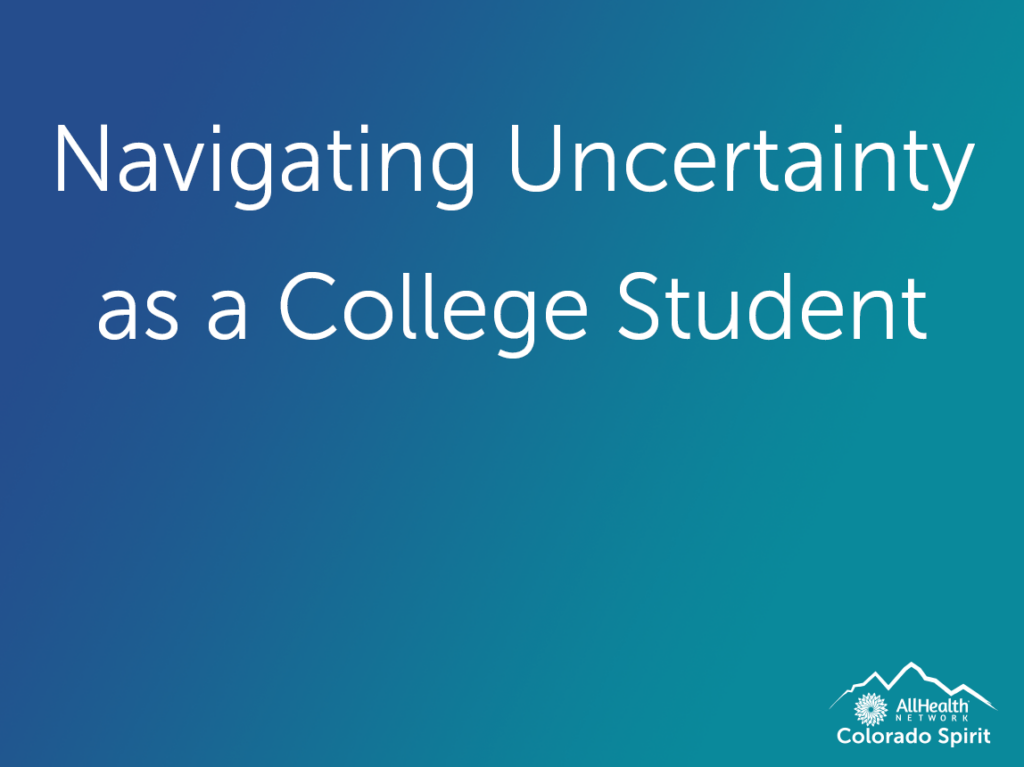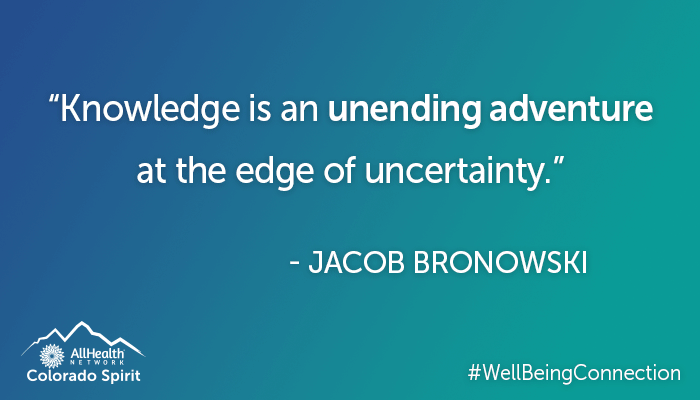Many thanks to Colorado Spirit Counselors, Chelsea Nibert and Ally Burdick, for writing this week’s piece. We especially appreciate Chelsea’s open sharing of her experience about being in college during the pandemic.
The Colorado Spirit team recently discussed some emerging themes around various college stressors that some of you may be experiencing.
From one college student to another, this has been a hard two years. Of course it has been difficult in terms of social distancing requirements, constant COVID testing, and mask-wearing; but, if you’re anything like me, it has been difficult to find the motivation to complete my program online. This shift has required students to maintain a similar output while massively adjusting our learning modalities and frankly, that can seem a bit unfair, stressful, and counterproductive. Below, I’ve outlined a few tips for easing this adjustment, and hopefully, you can apply one or two to your current situation to help yourself stay focused on the end goal.
Students have tackled unprecedented obstacles over the last two years as a result of the ongoing pandemic.
A survey in the fall of 2020 revealed that “83 percent of students said their mental health had negatively impacted their academic performance within the past month, and that two-thirds of college students are struggling with loneliness and feeling isolated—an all-time high prevalence that reflects the toll of the pandemic and the social distancing necessary to control it.” The truth is the findings of this study are not surprising. With ongoing changes to daily routines, interruptions in education, and strain on personal relationships, it is not hard to see how important prioritizing mental health has become.
If you are a stressed student here are some tips for prioritizing mental health in our everyday habits:
- Challenge yourself to be your authentic self in class. Share how you feel based on your experiences and try to avoid agreeing with the masses if you feel differently. This self-representation will help develop your confidence and understanding of YOU.
- It can be difficult to prioritize schoolwork amongst our everyday chaos. However, notice how you feel when you avoid procrastination and have the weight of undue assignment lifted for the week. This little shift can make a big difference.
- The biggest challenge for all of us – limiting media intake and screen time. Check out this Tuesday Talk from the Colorado Spirit team at AllHealth Network on creating a Happy Home screen. You can also try setting time limits on your media consumption to help interrupt a scroll spiral.
- Prioritizing sleep and good sleep hygiene can make all the difference in our ability to be productive. Try creating a nighttime routine that you look forward to and can stick to. Watch yourself begin to wake up well-rested and ready to take on whatever the day throws at you.
If you live with a stressed student:
- Be communicative and try your best to accommodate a space for them that is calm and organized. Ask them what would help, possibly a sound playing device that provides ambient background studying noises? Or maybe it’s a more defined “office” space that they can come to only for getting things done.
- Encourage the maintenance of healthy habits, like getting enough sleep, limiting substance use, eating enough, and spending time with social supports.
If you want to help a stressed student:
- Offer a listening ear, especially if you have been in their shoes before. Furthermore, help them problem solve. They are navigating uncharted waters. Some external encouragement in finding strategies to help can mean the world.
- Help create hope. Instead of silver lining their experience, try emphasizing the products of their hard work. Or maybe compliment their resilient nature when they face a task with confidence and pride. Check out this blog post on providing hope and support for college students.
- Ask about needs directly. We cannot fix anyone or anything, but we can listen for ways to help lighten the intensity. Check out this weekly wellness blog post for more on supporting students through uncertainty.
I hope our readers are able to take something away from this post that will aid a student who is struggling to stick to ever-changing learning agendas and school regulations. Beyond the aforementioned tips, it is important to keep in mind that reactions that include frustration, anger, sadness, and hopelessness are common threads among those experiencing similar circumstances. I am here with you, and we can do this.
Hang in there, you got this!
If speaking to someone would help, please reach out.
AllHealth Network provides several supports:
- To speak with someone in the Colorado Spirit Program about stress related to the pandemic, please call 720-707-6789 or visit our webpage at allhealthnetwork.org/Colorado-Spirit
- For information about other services at AllHealth Network or to get connected with ongoing behavioral health support, please call 303-730-8858. AllHealth Network is continuing to provide service via telehealth or by phone and our Crisis Walk-in Center remains open 24/7.
If you are experiencing a mental health crisis and are in need of immediate assistance, please call the Colorado Crisis Hotline at 1-844-493-8255 (TALK) or text TALK to 38255.
How do you know if you’re experiencing a mental health crisis? Click here to learn about mental health crisis warning signs to look out for from the National Alliance on Mental Illness (NAMI).
Be sure to follow us on Facebook to receive information about our free groups and get notifications when we post coping tips, mindfulness suggestions, and more.
Resources
- AllHealth Network Colorado Spirit – Another Back to School Season During the Pandemic
- AllHealth Network Colorado Spirit – How to Cope with Uncertainty
- AllHealth Network Colorado Spirit Tuesday Talk – Avoiding Procrastination



